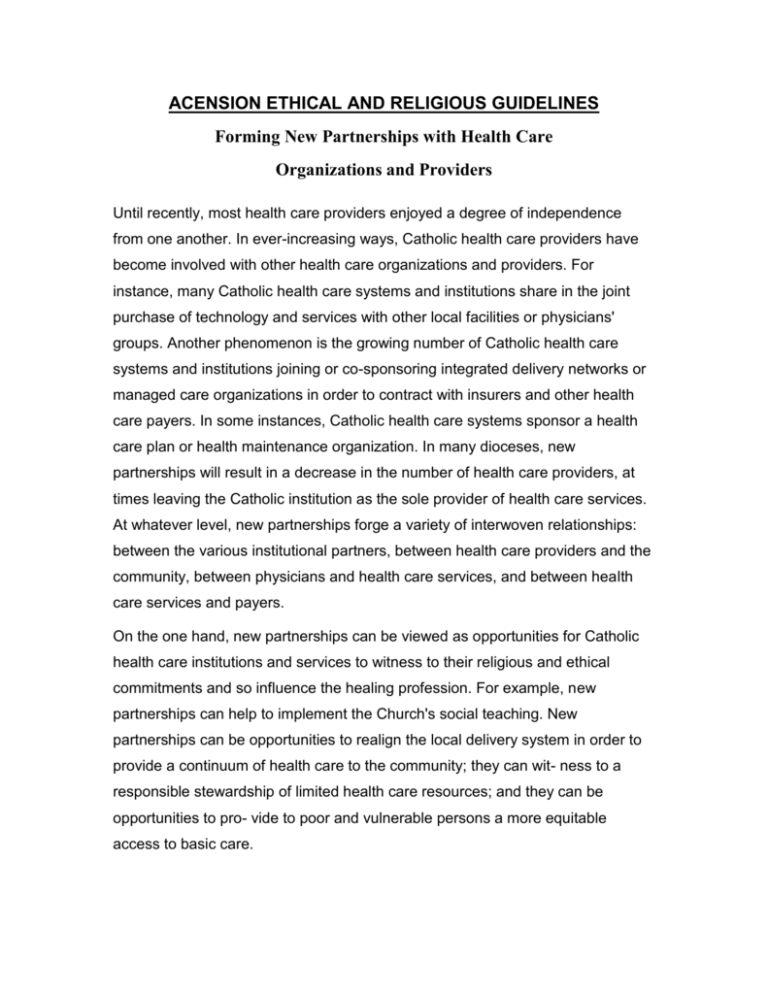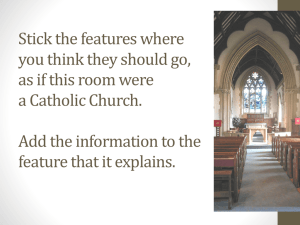ACENSION ETHICAL AND RELIGIOUS GUIDELINES
advertisement

ACENSION ETHICAL AND RELIGIOUS GUIDELINES Forming New Partnerships with Health Care Organizations and Providers Until recently, most health care providers enjoyed a degree of independence from one another. In ever-increasing ways, Catholic health care providers have become involved with other health care organizations and providers. For instance, many Catholic health care systems and institutions share in the joint purchase of technology and services with other local facilities or physicians' groups. Another phenomenon is the growing number of Catholic health care systems and institutions joining or co-sponsoring integrated delivery networks or managed care organizations in order to contract with insurers and other health care payers. In some instances, Catholic health care systems sponsor a health care plan or health maintenance organization. In many dioceses, new partnerships will result in a decrease in the number of health care providers, at times leaving the Catholic institution as the sole provider of health care services. At whatever level, new partnerships forge a variety of interwoven relationships: between the various institutional partners, between health care providers and the community, between physicians and health care services, and between health care services and payers. On the one hand, new partnerships can be viewed as opportunities for Catholic health care institutions and services to witness to their religious and ethical commitments and so influence the healing profession. For example, new partnerships can help to implement the Church's social teaching. New partnerships can be opportunities to realign the local delivery system in order to provide a continuum of health care to the community; they can wit- ness to a responsible stewardship of limited health care resources; and they can be opportunities to pro- vide to poor and vulnerable persons a more equitable access to basic care. On the other hand, new partnerships can pose serious challenges to the viability of the identity of Catholic health care institutions and services, and their ability to implement these Directives in a consistent way, especially when partnerships are formed with those who do not share Catholic moral principles. The risk of scandal cannot be underestimated when partnerships are not built upon common values and moral principles. Partnership opportunities for some Catholic health care providers may even threaten the continued existence of other Catholic institutions and services, particularly when partner- ships are driven by financial considerations alone. Because of the potential dangers involved in the new partnerships that are emerging, an increased collaboration among Catholicsponsored health care institutions is essential and should be sought before other forms of partnerships. The significant challenges that new partner ships may pose, however, do not necessarily preclude their possibility on moral grounds. The potential dangers require that new partnerships undergo systematic and objective moral analysis, which takes into account the various factors that often pressure institutions and services into new partnerships that can diminish the autonomy and ministry of the Catholic partner. The following directives are offered to assist institutionally based Catholic health care services in this process of analysis. To this end, the United States Conference of Catholic Bishops (formerly the National Conference of Catholic Bishops) has established the Ad Hoc Committee on Health Care Issues and the Church as a resource for bishops and health care leaders. This new edition of the Ethical and Religious Directives omits the appendix concerning cooperation, which was contained in the 1995 edition, Experience has shown that the brief articulation of the principles of cooperation that was presented there did not sufficiently forestall certain possible misinterpretations and in practice gave rise to problems in concrete applications of the principles. Reliable theological experts should be consulted in interpreting and applying the principles governing cooperation, with the proviso that, as a rule, Catholic partners should avoid entering into partnerships that would involve them in cooperation with the wrong doing of other providers. Directives Decisions that may lead to serious consequences for the identity or reputation of Catholic health care services, or entail the high risk of scandal, should be made in consultation with the diocesan bishop or his health care liaison. Any partnership that will affect the mission or religious and ethical identity of Catholic health care institutional services must respect church teaching and discipline. Diocesan bishops and other church authorities should be involved as such partnerships are developed, and the diocesan bishop should give the appropriate authorization before they are completed. The diocesan bishop's approval is required for partnerships sponsored by institutions subject to his governing authority; for partnerships sponsored by religious institutes of pontifical right, his nihil obstat should be obtained. If a Catholic health care organization is considering entering into an arrangement with another organization that may be involved in activities judged morally wrong by the Church, participation in such activities must be limited to what is in accord with the moral principles governing cooperation. Catholic health care organizations are not permitted to engage in immediate material cooperation in actions that are intrinsically immoral, such as abortion, euthanasia, assisted suicide, and direct sterilization. The possibility of scandal must be considered when applying the principles governing cooperation. Cooperation, which in all other respects is morally licit, may need to be refused because of the scandal that might be caused. Scandal can sometimes be avoided by an appropriate explanation of what is in fact being done at the health care facility under Catholic auspices. The diocesan bishop has final responsibility for assessing and addressing issues of scandal, considering not only the circumstances in his local diocese but also the regional and national implications of his decision. The Catholic partner in an arrangement has the responsibility periodically to assess whether the binding agreement is being observed and implemented in a way that is consistent with Catholic teaching. For further reference refer to: Ethical and Religious Directives for Catholic Health Care Services, Fourth Edition, Pub No. 5-452 United States Conference of Catholic Bishops Washington, D.C. ISBN 1-57455452-2 800-235-8722 or visit www.usccb.org







